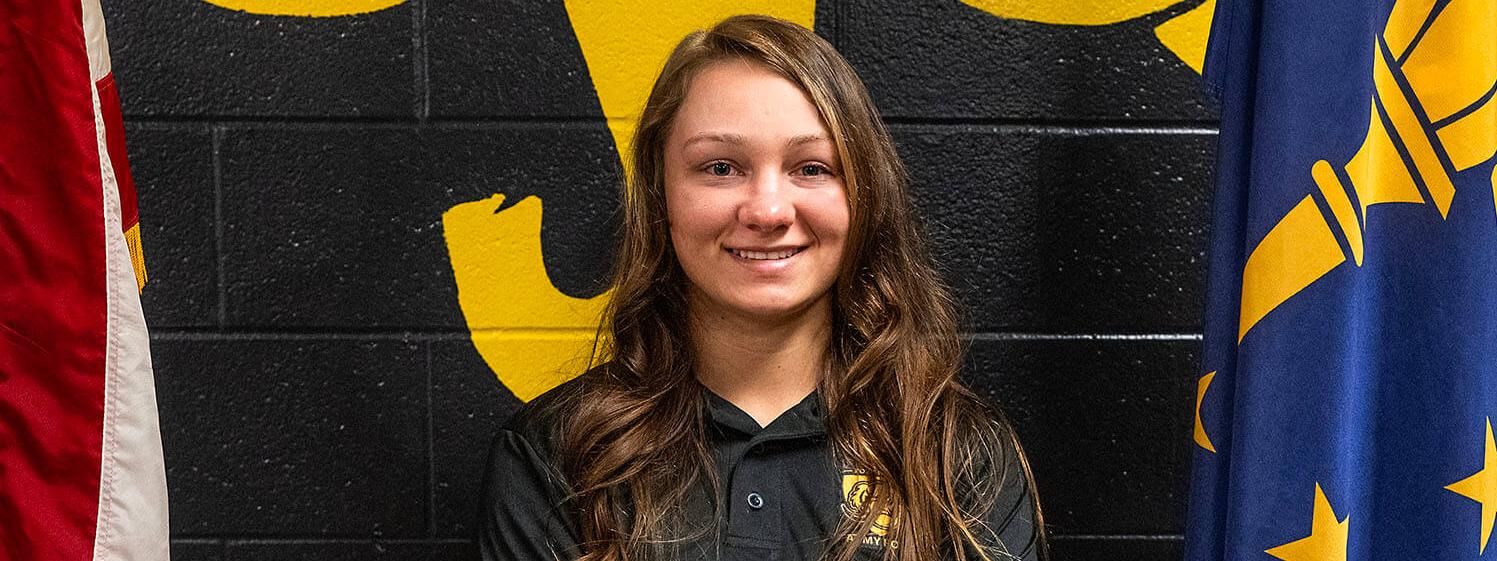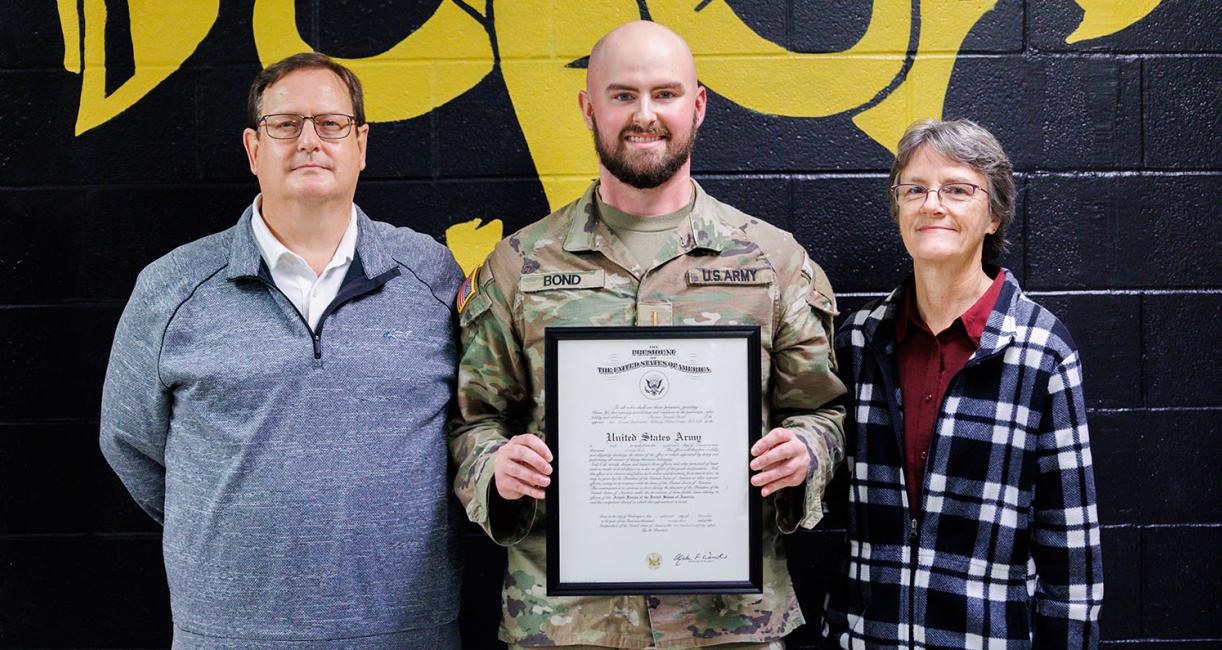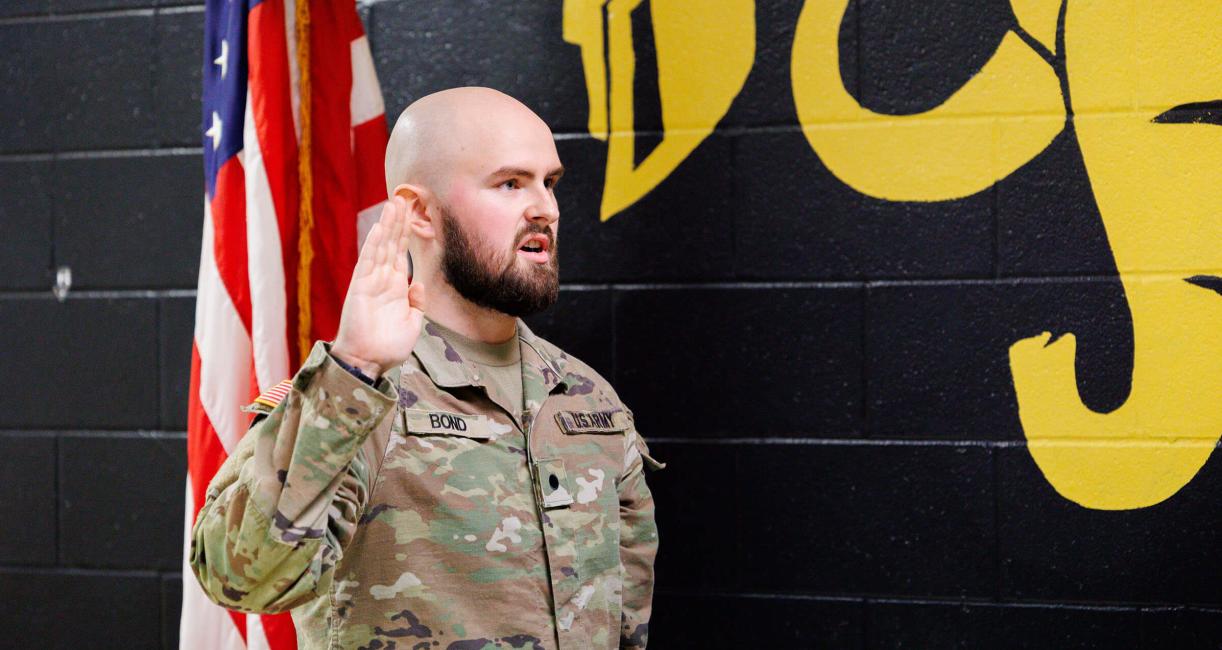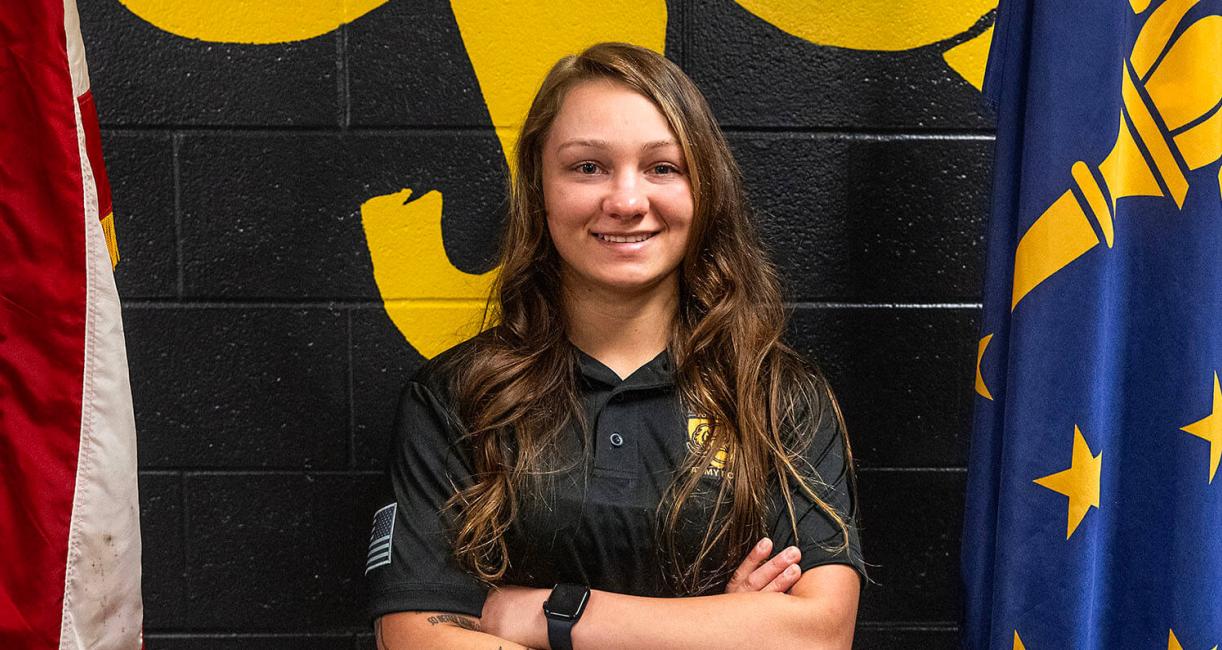





Tom Bond receives the rank of Lieutenant from Major David Clark, assistant professor of military science and the U.S. Army Officer responsible for the PFW program.

Parents Joe and Patty Bond and their son Tom, who received the rank of Lieutenant at a commissioning ceremony on Dec. 18, 2023.

Purdue University Fort Wayne student and ROTC member Tom Bond received his commission as a lieutenant in the U.S. Army on Dec. 18 during ceremonies at PFW’s Ginsberg Hall.

After graduating with a bachelor’s degree in 2022, Audrey Dickerson returned to campus this fall as a recruitment officer.




ROTC positions cadets for leadership roles during and after military service
By Blake Sebring
February 22, 2024
Though an excellent student, Audrey Dickerson was unsure where she wanted to go to college and even considered enlisting with the Army after four years participating in the Marion High School Junior Reserve Officer Training Corps program. However, some teachers encouraged her to apply for an ROTC scholarship, and that led Dickerson to Purdue University Fort Wayne to study public policy with a concentration in criminal justice.
After graduating with a bachelor’s degree in 2022, she returned to campus this fall as a Gold Bar Recruiter and is now training as an Army field artillery 2nd Lieutenant in Oklahoma.
“It was very much worth it and changed my life,” Dickerson said of her experiences at PFW. “It put me on a path where I don’t think I would have had the discipline and developed the work skills that I have without it.”
Specifically, the ROTC experience transformed her, Dickerson said, building her into a confident, tough, strong, and more assertive leader. She tested herself, honed skills, and now plans to make the Army her career.
Housed in Dolnick Learning Center on PFW’s north campus, the ROTC program is kind of a hidden gem. There are 32 students taking part, including some from Indiana Tech, the University of Saint Francis, and Ivy Tech Community College. The program is growing slowly, much like its recruits.
“At PFW, our cadets are probably as tight-knit as any cadets you’ll see,” said Maj. David Clark, the assistant professor of military science and U.S. Army officer responsible for the PFW program. “Our biggest recruiting assets are the cadets we already have.”
The camaraderie is created through physical and mental training, specialized classes, and their commitment to the country and each other. They help one another become leaders, building more each academic year with specific programming.
When Lieutenant Mac Hathaway, B.S. ’22, transferred to PFW after three years at Ohio State University, he was installed as a squad leader, and Dickerson served under him as a team leader even though she was just a freshman.
“I think the biggest evolution I’ve seen was with her confidence," said Hathaway, who is now PFW’s recruiting operations officer. "She knew everything, but she was too afraid to say it. As we both progressed in the program, she really learned to fly and get herself out there, and that’s really what every cadet experiences.”
Dickerson said part of her progression included taking four Arabic classes under Farah Combs, senior lecturer in Arabic and Honors Program director.
“Audrey stands out as one of the most exceptional students I have encountered,” Combs said. “While she was officially my student, she is one of the people who taught me and reminded me of a valuable lesson in life – resilience. I am proud of her accomplishments and remain in continued admiration of her determination and strength.”
The Army also paid Dickerson $750 per semester to take foreign language classes.
“She makes learning Arabic very, very easy,” Dickerson said. “She is such an amazing person, and her teaching style is phenomenal. I think a lot of people look at Arabic as intimidating, but it is not at all, and I plan on using it. I just think it’s so important to learn some kind of foreign language.”
About 25% of students in the ROTC program receive scholarships, freeing them from most expenses and post-college debt. Dickerson said she’s planning to pursue a master's degree in public policy and may consider running for public office someday.
ROTC students commit to serve at least three years on active duty in the Army, or six years in the National Guard. Hathaway said most incoming cadets are either already serving in the National Guard or are following the example of parents who served in active duty.
Cadets are taught several skills including rappelling and ropes, land navigation and map reading, basic rifle marksmanship, squad battle drills, and combat water. Then there’s survival training, combat patrolling, first aid and medical, and communications. There are basic courses for freshmen and sophomores and advanced courses for juniors and seniors. There are also several specialized areas of study such as nursing and engineering.
Clark said the benefits of joining the ROTC program include developing lifetime friendships, financial aid, leadership training and experience, and guaranteed job placement after graduation that comes with good pay and great benefits.
“What I try to explain to my kids and what I’ve seen over the past 20 years, let’s say someone goes active duty for four years,” Clark said, “they are getting four years of leadership experience. When they come out of the Army, they’re going to command $80,000 to $100,000 a year because they’ve already been in charge of 30 to 130 people that they’re solely responsible for as opposed to their peers who went to college straight to the private sector that may be responsible for 5-10 people during the same time.




